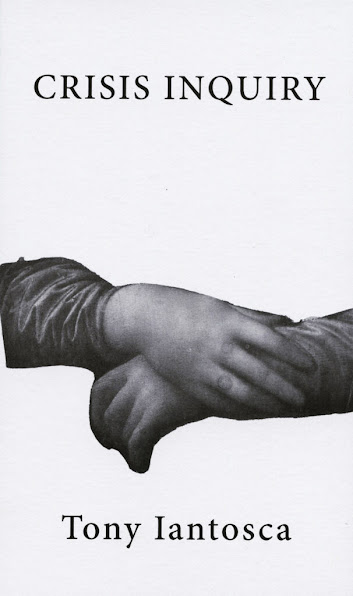Crisis Inquiry, Tony Iantosca
Ugly Duckling
Presse, 2023
After having seen the work of Brooklyn-based writer, poet and educator Tony Iantosca in a variety of journals over the past decade (first encountering his work in 2016 via an issue of Ugly Duckling Presse’s late, lamented poetry journal 6x6), it is good to finally catch a collection, his third full-length, Crisis Inquiry (Ugly Duckling Presse, 2023). This latest title from Iantosca follows on the heels of a handful of his chapbook and full-length collections, including Naked Forest Spaces (Third Floor Apartment Press), Shut up, Leaves (United Artists Books), Team Burnout (Overpass Books) and To the Attic (Spuyten Duyvil). Crisis Inquiry exists as a book-length triptych, offering parts one, two and three, each of which are composed as accumulations of otherwise-untitled (most of the pieces, anyway) and extended poem-stretches that run down the lengths of each page. “My hands,” he writes, to open the poem “On Hands” in the second section, “worry about / me. The moment / hands fill / with inquiry / is not a moment / my hands had / the luxury / of being interested / in.” Structurally, one might see echoes of the work of Brooklyn poet Anselm Berrigan, or even comparisons to that of Canadian poets ryan fitzpatrick or Stephen Collis, for a kind of ongoingness that also articulates, through a fractured language, a particular kind of urgency, and even an anxiety. “Spark on the edge / of hoping,” he writes, in part of the opening section, “can it / be a poem or the / polished sky / the cyborg delivered / with apologies / for starving you. / No, out there / they won’t help / you today, they’re / talking here inside / bedrooms, tending / to the watching / and watching the wind / tear a feeling out / of the tree.”
Hope’s new drought
is the development
whose
story
we
breathe well
over
coffee someone
made
right for us
holding
open
the
window’s
determinate
pageant
of air
stereo
and
nutcracker. It was
raining
on the poetic
barstool
where
people
sat breaking in
a century’s
fracture
to see
how it feels
as a
joke adorning
social
graces. Next time
try
cycling through
every
thread’s first
fray to
know which cloud
finds
us as information
we can’t
even hide.
As the press page for the collection offers: “Crisis Inquiry is a collection of poems in three parts that unsettles the lyric poem from within its constraints in ways that are both sardonic and searching. These poems probe the corners of a crisis of inquiry both intimate and general, inquiring into the registers, rhetorics, and scales of the various ongoing crises we live through daily. Iantosca’s third full-length collection of poetry, Crisis Inquiry stages satire and candor as alternating strides of the same figure, walking to and fro between you and me.” Throughout his lyric, the details are intricate, intimate and detailed, working across a space so close that occasionally it blurs, offering threads propelled and fueled by social, political and environmental concerns. As well, he offers details of the personal and domestic that occasionally veer into the mundane. Throughout Crisis Inquiry, the language of Iantosca’s ongoingness seeks and questions, as words offer what words might, blending moments and queries, commentary and revelation, all in a lyric that reaches across (even into its own limitations) uncomfortable knowing into that endless possibility of what lay beyond.
The places
to write
are not
places.
The writing
that aspires
to placement
stops
speaking
as the tree
made
the place
a
subdivision
of
larger divisions
which
have nothing
to do
with mathematics
but
with the tenancy
of words
becoming
a place
by crowding
its
air. I can’t
guarantee
a mailbox
and no
one is certain
there
will be
language
for the more
difficult
patterns
of
worry or of brick,
this
one goes on top
of that
one, and so on
but the
leaves betray
geometric
appraisal
and the
writing
commensurate
with
the light’s
internal
divisions
and the
violence
people think
I can
do with this
fail to
reach an agreement
with
anyone’s idea
of a
language. It isn’t like
I can
try to find
a place
for any of this without
making
the potential
for
something else to appear
less
possible. Or maybe
that’s
just a poor excuse
for why
writing has made
sky’s
edges less visible
though I’m
suppose
to just
trust that the whole
time it’s
over there. This
is a
dim lamp, a filthy
desk
and its wires,
but
that’s as far as I’ve gotten.
Born in Ottawa, Canada’s glorious capital city, rob mclennan currently lives in Ottawa, where he is home full-time with the two wee girls he shares with Christine McNair. The author of more than thirty trade books of poetry, fiction and non-fiction, he won the John Newlove Poetry Award in 2010, the Council for the Arts in Ottawa Mid-Career Award in 2014, and was longlisted for the CBC Poetry Prize in 2012 and 2017. In March, 2016, he was inducted into the VERSe Ottawa Hall of Honour. His most recent titles include the poetry collections the book of smaller (University of Calgary Press, 2022) and World’s End, (ARP Books, 2023), and a suite of pandemic essays, essays in the face of uncertainties (Mansfield Press, 2022). An editor and publisher, he runs above/ground press, periodicities: a journal of poetry and poetics and Touch the Donkey. He is editor of my (small press) writing day, and an editor/managing editor of many gendered mothers. In spring 2020, he won ‘best pandemic beard’ from Coach House Books via Twitter, of which he is extremely proud (and mentions constantly). He spent the 2007-8 academic year in Edmonton as writer-in-residence at the University of Alberta, and regularly posts reviews, essays, interviews and other notices at robmclennan.blogspot.com



